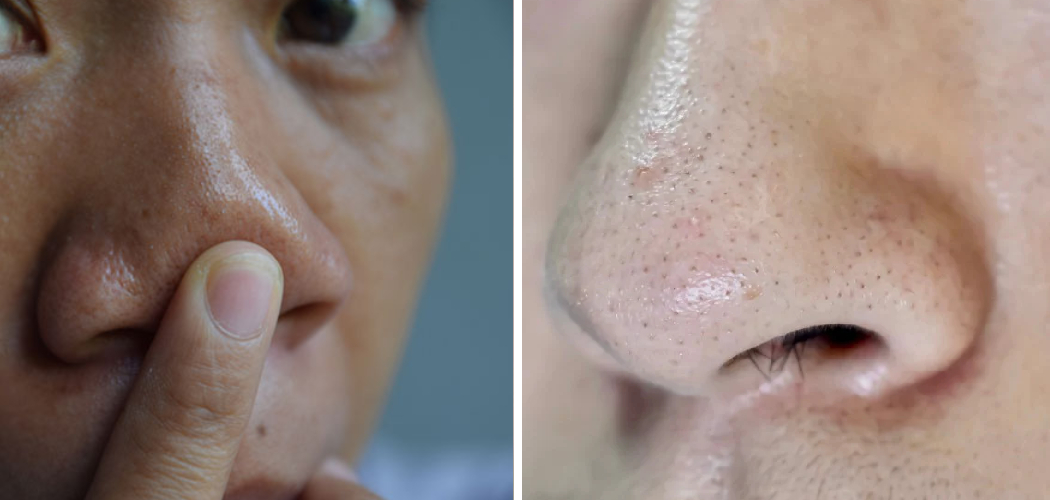Many people struggle with the appearance of an oily nose, which is a frequent issue with their skin. It is caused by an accumulation of excess sebum, which is a naturally occurring oil that is produced by the skin. This results in the nose appearing glossy and greasy. So, we need to know oily nose to get rid of it.
An oily nose may be caused by a number of things, including heredity, hormone changes, food, stress, and environmental factors. People who naturally have oily skin are more likely to have noses that are oily as well.
Being prone to oil production in the nose can result in a variety of skin issues, including acne, blackheads, and whiteheads. These problems with the skin are brought on by an overabundance of sebum, which, when combined with germs, dead skin cells, and dirt, can block pores and lead to inflammation.
It is crucial to follow a consistent skincare routine that includes washing, exfoliating, and moisturizing in order to effectively treat an oily nose. These three steps should be performed in that order. It is helpful to remove excess oil and other impurities from the skin by cleansing it twice a day using a mild cleanser. When you exfoliate your skin once or twice a week, you help to eliminate dead skin cells and unclog your pores. Protecting the skin from drying out and restoring its natural oil balance can be accomplished by using moisturizer.
In addition, the use of skin care products that do not contain oil, refraining from touching the face, and maintaining a balanced diet and lifestyle can all assist in the management of an oily nose.
If you are concerned about your oily nose or are having serious skin problems, it is recommended that you contact a dermatologist for specialized advice and treatment. Dermatologists are trained to diagnose and treat a wide range of skin conditions.
What could be the cause of my nose being so oily?
There are a number of potential contributors to an oily nose, including heredity, hormonal shifts, dietary choices, stress, and environmental influences.
- It’s All in Your Genes: people who naturally have oily skin are more likely to have an oily nose. It is common to inherit oily skin, which can be caused by an excess production of sebum, the natural oil produced by the skin.
- Changes in Hormone Levels: Hormonal shifts such as those that occur during puberty, menstruation, pregnancy, and menopause can cause an increase in sebum production, which in turn can cause an oily nose.
- Diet: Eating a diet that is high in processed and refined foods, sugar, and unhealthy fats can cause an increase in the amount of oil that is produced on the nose and other regions of the skin.
- Stress: Prolonged exposure to stress has been linked to increased production of the hormone cortisol, which in turn stimulates the production of sebum and may result in an oily nose.
- Environmental Causes: An oily nose can be caused by prolonged exposure to variables such as hot and humid weather, pollution, and harsh skincare products.
In general, an oily nose is the result of an overproduction of sebum, which can be influenced by a number of different causes, both internal and external.
What should I do to get rid of it?
Even if it is impossible to entirely eliminate oily skin, there are a number of things that can be done to control the look of an oily nose and make it less noticeable.
- Cleaning, use a mild cleanser that is developed for oily skin at least twice daily and wash your face thoroughly both times. The removal of excess oil, grime, and other impurities from the skin will be facilitated as a result of this.
- To eliminate dead skin cells and prevent pores from becoming clogged, it is important to exfoliate your skin once or twice each week using either a physical scrub or a chemical exfoliator.
- It is vital to moisturize your skin on a daily basis, even if you already have oily skin, in order to keep your skin moisturized and prevent it from creating extra oil. Choose a moisturizer that isn’t oil-based, isn’t heavy, and won’t clog your pores.
- Make use of oil-absorbing products. When searching for a facial cleanser, go for one that has salicylic acid, benzoyl peroxide, or clay. These are some of the components that can assist to absorb excess oil and minimize shine.
- Throughout the day, make sure to bring blotting papers with you so that you can immediately reduce shine and absorb excess oil.
- Touching your face can transfer oils and bacteria from your hands to your skin, which can cause breakouts and increase the amount of oil your skin produces. To avoid this, avoid touching your face.
- Maintaining a healthy lifestyle can help to control hormone levels and minimize stress, both of which can contribute to oily skin. Eating a diet that is balanced, drinking plenty of water, and getting enough sleep are all examples of healthy lifestyle choices.
- After cleansing, using a toner can assist in further removing excess oil and pollutants from the skin. Toners are often applied after cleansing. You should look for toners that contain chemicals like witch hazel, tea tree oil, or salicylic acid, as these can help to control oil production and minimize inflammation on the skin.
- Always protect your skin from the sun by using sunscreen. Sun damage can cause your skin to produce more oil and can also harm your skin. Your skin can be protected from the potentially damaging effects of the sun by using a broad-spectrum sunscreen that has a sun protection factor (SPF) of 30 or greater.
- Makeup that won’t clog pores should be non-comedogenic, so make sure to look for items that say “non-comedogenic” on the packaging. Steer clear of heavy, oil-based cosmetic products because they might make your nose look even oilier.
Treatments that help regulate oil production should be considered for more severe cases of oily skin. These treatments include chemical peels, microdermabrasion, and laser treatments, among others.
Consult a Dermatologist
It is vital to visit a dermatologist for individualized guidance and treatment if your oily nose is chronic or occurs in conjunction with other skin disorders such as acne. A dermatologist can examine your skin and determine the best course of action. They could advise you to use items or procedures that require a prescription in order to assist manage your oily nose.
Keep in mind that in order to control an oily nose, you need to maintain a consistent skincare routine in addition to healthy living practices. You may get a healthy, balanced complexion if you have patience and keep trying different things until you find what works best for your skin. Although it may take some trial and error to figure out what works best for your skin,
It is imperative that you contact a dermatologist in order to receive guidance and treatment for your oily nose, especially if it is severe or occurs in conjunction with other skin issues such as acne.
You Can Check It Out to Dry Skin Under the Nose




